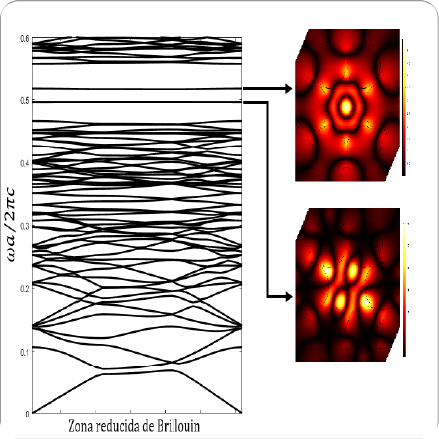Efectos de la presión hidrostática sobre los modos defectivos en un cristal fotónico bidimensional semiconductor con geometría hexagonal
DOI:
https://doi.org/10.24054/bistua.v18i1.208Palabras clave:
Cristal fotónico, presión hidrostática, estructura de bandas, método de expansión en ondas planas, modos localizadosResumen
Las propiedades ópticas de las estructuras caracterizadas mediante una función dieléctrica periódica como los cristales fotónicos (CFs), ha despertado interés por sus aplicaciones en diversos campos de la óptica y la optoelectrónica. Cuando la periodicidad de los CFs se rompe por la inserción de defectos, permite el confinamiento de modos de luz. En esta contribución, utilizando el método de expansión en ondas planas para el modo de polarización transversal magnética y el Software computacional MATLAB, se estudia el efecto de la presión hidrostática sobre la estructura de bandas en un cristal fotónico bidimensional (CF-2D) con red hexagonal, compuesto por agujeros de aire en un fondo de material semiconductor de
fosfuro de galio (GaP), que se caracteriza por tener el índice de refracción más alto entre los semiconductores binarios y su rango de transmisión se utiliza en aplicaciones de luz visible e infrarrojo cercano. Inicialmente, se estudia la relación de dispersión del cristal fotónico regular (sin defecto) y se analiza la zona de Banda Fotónica Prohibida (BFP); posteriormente se
aumenta la presión hidrostática, generando que la estructura de banda fotónica presente un desplazamiento a regiones de alta frecuencia. Posteriormente, utilizando la técnica de la supercelda se considera un defecto puntual dentro de la estructura, que reemplaza un agujero de aire por material semiconductor, que genera estados permitidos o modos de defecto en el interior del bandgap fotónico. Al aumentar la presión hidrostática se observa que el ancho del bandgap fotónico permanece inalterado y los modos de defecto presentan un desplazamiento a valores de altas frecuencias.
Descargas
Citas
Massaro A., Photonic Crystals: Introduction, Applications and Theory, 1st Edition, InTechOpen, 2012.
Joannopoulos J., Johnson S., Winn J., Meade R., Photonic Crystals: Molding the Flow of Light, 2nd Edition, Princeton University Press, 2008.
Yablonovitch E., Inhibited Spontaneous Emission in Solid-State Physics and Electronics. Phys. Rev. Lett. 58(20) (1987) 2059-2062. https://doi.org/10.1103/PhysRevLett.58.2059
S Jhon., Strong localization of photons in certain disordered dielectric superlattices. Phys. Rev. Lett. 58(23) (1987) 2486-2489. https://doi.org/10.1103/PhysRevLett.58.2486
Dressel M., Grüner G., Electrodynamics of Solids: Optical Properties of Electrons in Matter, 1st Edition, Cambridge University Press, 2002.
Aschcroft N., Mermin D., Wei D., Solid State Physics, Cengage Learning Asia, 2016.
Gong Q., Hu X., Photonic Crystals: Principles and Applications, 1st Edition, Pan Stanford Publishing, 2013.
Obayya S., Farhat M., Hameed O., Areed N., Computational Liquid Crystal Photonics: Fundamentals, Modelling and Application, Wiley, 2016.
Hameed M., Obayya S., Computational Photonic Sensors, Springer, 2018.
Yablonovitch E., Photonic crystals: semiconductors of light. Sci. Am. 285(6) (2001) 46-55. https://doi.org/10.1038/scientificamerican1201-46
Sanchez A., Porta A., Orozco S., Photonic band-gap and defect modes of a one-dimensional photonic crystal under localized compression. J. Appl. Phys. 121(17) (2017),173101. https://doi.org/10.1063/1.4982760
Gharaati A., Zare Z., The effect of temperature on one-dimensional nanometallic photonic crystals with coupled defects. Pramana-J. Phys. 88(5) (2017) 75. https://doi.org/10.1007/s12043-017-1380-5
Berman O., Lozovik Y., Eiderman S., Coalson R., Superconducting photonic crystals: numerical calculations of the band structure. Phys. Rev. B 74(9) (2006) 092505. https://doi.org/10.1103/PhysRevB.74.092505
Liu N., Guo H., Fu L., Kaiser S., Schweizer H., Giessen H., Three-dimensional photonic metamaterials at optical frequencies. Nat. Mater. 7(1) (2008) 31-37. https://doi.org/10.1038/nmat2072
Lin M., Jao R., Finite element analysis of photon density of states for two-dimensional photonic crystals with in-plane light propagation. Opt. Express 15(1) (2007) 207–218. https://doi.org/10.1364/OE.15.000207
Taflove A., Hagness S., Computational Electrodynamics: The Finite-Difference Time-Domain Method, 3rd Edition, Artech House Publishers, 2005.
Shumpert J., Modeling of Periodic Dielectric Structures (Electromagnetic Crystals), Ph.D. thesis, University of Michigan, 2001.
Skorobogatiy M., Yang J., Fundamentals of Photonic Crystal Guiding, 1st Edition, Cambridge University Press, 2009.
Sakoda K., Optical Properties of Photonic Crystals, Springer, 2nd Edition, 2004.
Sözüer H., Haus J., Inguva R., Photonic bands: convergence problems with the plane-wave method. Phys. Rev. B 45(24) (1992) 13962-13972. https://doi.org/10.1103/PhysRevB.45.13962
Aly A., Elsayed H., El-Naggar S., Tuning the flow of light in two-dimensional metallic photonic crystals based on Faraday Effect. J. Mod. Optics 64(1) (2017) 74–80. https://doi.org/10.1080/09500340.2016.1208298
Duque C., Mora-Ramos M., The two-dimensional square and triangular photonic lattice under the effects of magnetic field, hydrostatic pressure and temperature. Opt. Quant. Electron 44(8-9) (2012) 375-392. https://doi.org/10.1007/s11082-012-9545-4
Porras-Montenegro N., Duque C., Temperature and hydrostatic pressure effects on the photonic band structure of a 2D honeycomb lattice. Phys. E 42(6) (2010) 1865-1869. https://doi.org/10.1016/j.physe.2010.02.016
Segovia F., Vinck H., Effects of hydrostatic pressure on the band structure in two-dimensional semiconductor square photonic lattice with defect. Phys. B 545 (2018) 203-209. https://doi.org/10.1016/j.physb.2018.06.014
Orfanidis S., Electromagnetic Waves and Antennas, NJ Rutgers University, New Brunswick, 2002.
Kittel C., Introduction to Solid State Physics, 8th Edition, Wiley, 2004.
Samara G., Temperature and pressure dependences of the dielectric constants of semiconductors. Phys. Rev. B 27(6) (1983) 3494-3505. https://doi.org/10.1103/PhysRevB.27.3494
Sukhoivanov I., Guryev I., Photonic Crystals: Physics and Practical Modeling, Springer, 2009.
Shangping G., Photonic Crystals: Modeling and Simulation, Ph.D. thesis, Department of Electrical & Computer Engineering, Old Dominion University, Norfolk VA, 2003.
Wu L., Zhuang F., He S., Degenerancy analysis for a supercell of a photonic crystal and its applications to the creation of band gaps. Phys. Rev. E 67 (2 Pt 2) (2003) 026612. https://doi.org/10.1103/PhysRevE.67.026612

Archivos adicionales
Publicado
Cómo citar
Número
Sección
Licencia
Derechos de autor 2020 BISTUA REVISTA DE LA FACULTAD DE CIENCIAS BASICAS

Esta obra está bajo una licencia internacional Creative Commons Atribución-NoComercial-SinDerivadas 4.0.
© Autores; Licencia Universidad de Pamplona.





